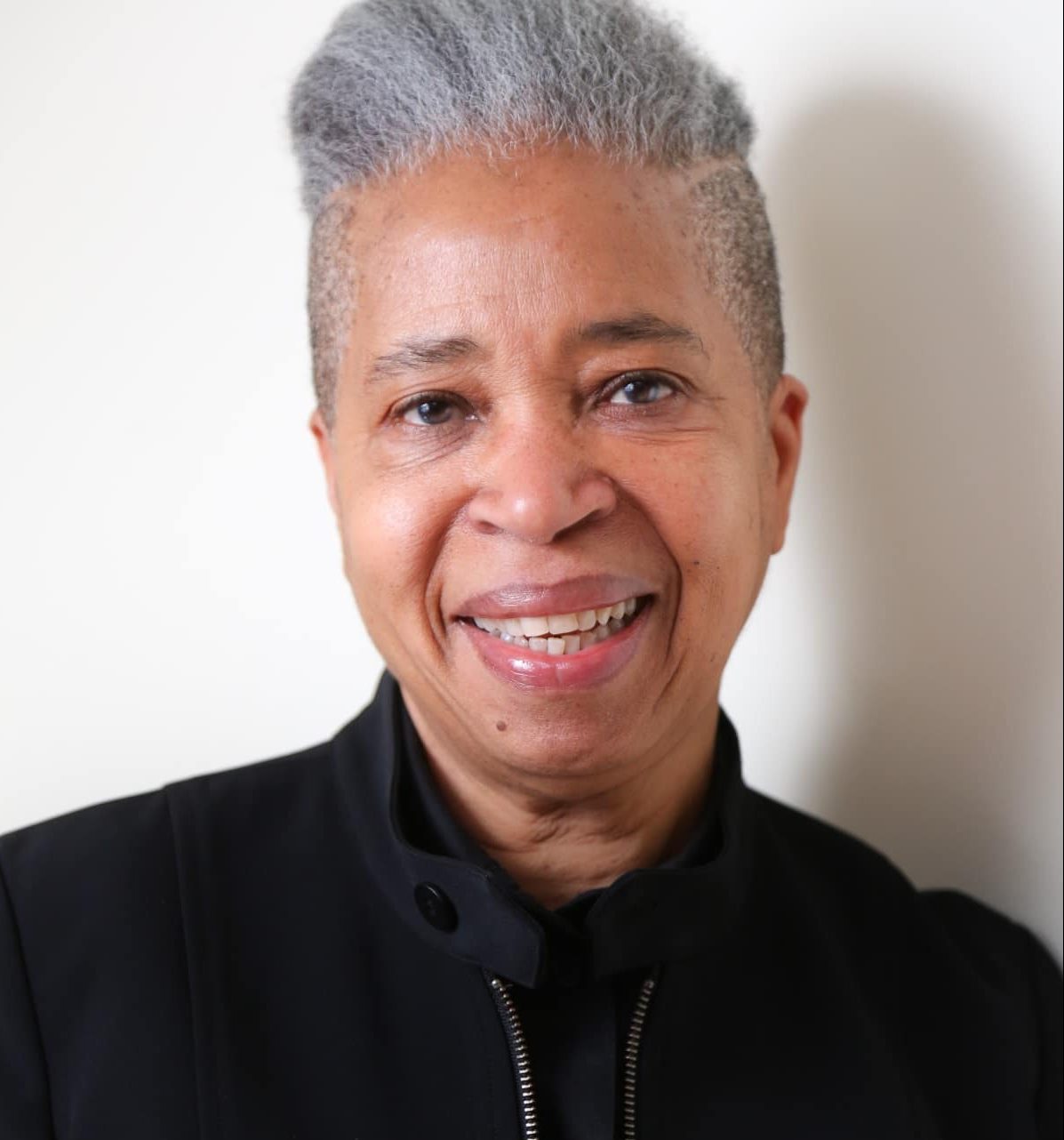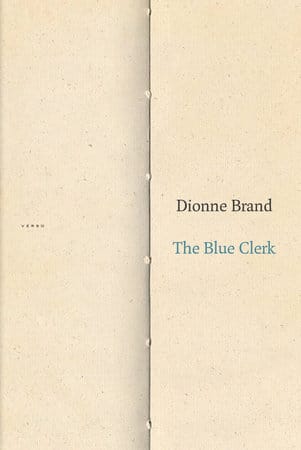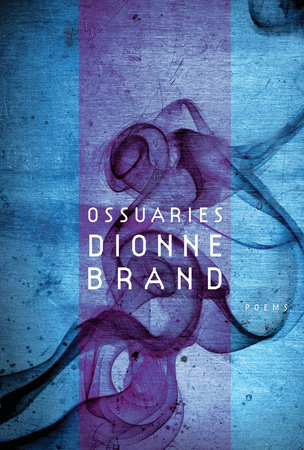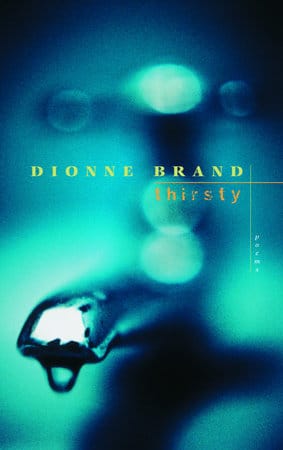
Dionne Brand was born in Trinidad and is a poet, novelist, non-fiction writer, filmmaker, educator, and activist. She has written 10 previous books of poetry, and is a winner of the Governor General’s Award, the Trillium Book Award, the Pat Lowther Memorial Award, and a past winner of the Griffin Poetry Prize. She was Toronto’s third Poet Laureate from 2009-2012. In 2017 she was named to the Order of Canada. Brand is a Professor in the School of English and Theatre Studies at the University of Guelph. She lives in Toronto.

Judges’ Citation
Dionne Brand’s The Blue Clerk is many things at once: a book-length ars poetica; an act of memory and reconfiguration; an extended meditation…
Dionne Brand’s The Blue Clerk is many things at once: a book-length ars poetica; an act of memory and reconfiguration; an extended meditation (one that moves at times directly, at others by a kind of philosophical osmosis) touching on the realms of history, politics, race and gender; an internal, consciously curated and interrogated dialogue that manages to create a space for all of these. Expansive, beautifully written, structurally compelling, and above all moving, The Blue Clerk is a book to be read (and re-read), not just for the pleasures of its language, but for the breadth of its vision, and the capaciousness of its thinking.

Judges’ Citation
Brand’s innovation on Ossuaries calls forth an entirely new sort of reading. The book is a triumph.
What Dionne Brand has done in Ossuaries is amazing. Working with a novel-length narrative about the life of an activist named Yasmine, who lives an underground existence on various continents, she has constructed a long poem, which is not a traditional seamless epic, nor a Poundian extended collage, but something else that seems quite new. The most remarkable part of her achievement is that in fulfilling the novelistic narrative ambition of her work, she has not sacrificed the tight lyrical coil of the poetic line. The story vaults us ahead with its emerging and receding characters, its passions and dramas, which include a violent bank robbery and tense escape, while each line holds us and demands we admire its complex beauties. The sensation of hurtling and, at the same time, being caught is uncanny. Brand’s innovation on Ossuaries calls forth an entirely new sort of reading. The book is a triumph.

Judges’ Citation
The word ‘thirsty’ in Dionne Brand’s long poem is a dying man’s last utterance.
The word ‘thirsty’ in Dionne Brand’s long poem is a dying man’s last utterance. Shot by the police in his own front yard, Alan is a Christie Pits Jeremiah as well as a tender nurturer of plants, an immigrant and a dreamer who thirsts for ‘a calming loving spot’ among the ‘conditional places’ and ‘conditional sentences’ that perpetuate the marginalisation of the poor. Thirsty is a reckoning with the pretenses of community in the soul-withering environments of today’s mega-cities. But Brand’s luscious and ferocious lines go beyond a critique of dystopian realities to construct, in themselves, in their keen, lyric intelligence, an oasis of truth, compassion, and sensuality.
Selected poems
by Dionne Brand
to undo, to undo and undo and undo this infinitive
of arrears, their fissile mornings,
their fragile, fragile symmetries of gain and loss
Copyright © 2010 by Dionne Brand, Ossuaries, McClelland & Stewart
from ossuary II
Havana, Yasmine arrived one early evening,
the stem of an orange dress,
a duffle bag, limp, with no possessions
the sea assaulted the city walls,
the air,
the birds assaulted the sea
she’s not coastal,
more used to the interiors of northern cities,
not even their ancillary, tranquil green-black lakes
though nothing was ever tranquil about her,
being there out of her elemental America
unsettles her, untethers her
being alive, being human, its monotony
discomfited her anyway, the opaque nowness,
the awareness, at its primal core, of nothing
a temporary ache of safety,
leafed her back like unfurling fiddleheads,
she glimpsed below the obdurate seduction of Atlantic
and island shore,
when they landed, a contradiction,
a peppery drizzle, an afternoon’s soft sun
the oiled air of Havana pushed its way onto the airplane,
leavened, domestic,
the Tupelov cabin like an oven darkening bread
Copyright © 2010 by Dionne Brand, Ossuaries, McClelland & Stewart
ossuary VIII
To verse, to turn, to bend, to plough, a furrow, a row, to turn around, toward, to traverse
When I was nine coming home one day from school, I stood at the top of my street and looked down its gentle incline, toward my house obscured by a small bend, taking in the dipping line of the two-bedroom scheme of houses, called Mon Repos, my rest. But there I’ve strayed too far from the immediate intention. When I was nine coming home from school one day, I stood at the top of my street and knew, and felt, and sensed looking down the gentle incline with the small houses and their hibiscus fences, their rosebush fences, their ixora fences, their yellow and pink and blue paint washes; the shoemaker on the left upper street, the dressmaker on the lower left, and way to the bottom the park and the deep culvert where a boy on a bike pushed me and one of my aunts took a stick to his mother’s door. Again, when I was nine coming home one day in my brown overall uniform with the white blouse, I stood on the top of my street knowing, coming to know in that instant when the sun was in its four o’clock phase and looking down I could see open windows and doors and front door curtains flying out. I was nine and I stood at the top of the street for no reason except to make the descent of the gentle incline toward my house where I lived with everyone and everything in the world, my sisters and my cousins were with me, we had our bookbags and our four o’clock hunger with us and our grandmother and everything we loved in the world were waiting in the yellow washed house, there was a hibiscus hedge and a buttercup bush and zinnias waiting and for several moments all this seemed to drift toward the past; again when I was nine and stood at the head of my street and looked down the gentle incline toward my house in the four o’clock coming-home sunlight, it came over me that I was not going to live here all my life, that I was going away and never returning some day.
Copyright © 2018 by Dionne Brand, The Blue Clerk, Penguin Random House Canada
from Verso 4
I
This city is beauty
unbreakable and amorous as eyelids,
in the streets, pressed with fierce departures,
submerged landings,
I am innocent as thresholds
and smashed night birds, lovesick,
as empty elevators
let me declare doorways,
corners, pursuit, let me say
standing here in eyelashes, in
invisible breasts, in the shrinking lake
in the tiny shops of untrue recollections,
the brittle, gnawed life we live,
I am held, and held
the touch of everything blushes me,
pigeons and wrecked boys,
half-dead hours, blind musicians,
inconclusive women in bruised dresses
even the habitual grey-suited men with terrible
briefcases, how come, how come
I anticipate nothing as intimate as history
would I have had a different life
failing this embrace with broken things,
iridescent veins, ecstatic bullets, small cracks
in the brain, would I know these particular facts,
how a phrase scars a cheek, how water
dries love out, this, a thought as casual
as any second eviscerates a breath
and this, we meet in careless intervals,
in coffee bars, gas stations, in prosthetic
conversations, lotteries, untranslatable
mouths, in versions of what we may be,
a tremor of the hand in the realization
of endings, a glancing blow of tears
on skin, the keen dismissal in speed
Copyright © 2002 by Dionne Brand, thirsty, McClelland & Stewart